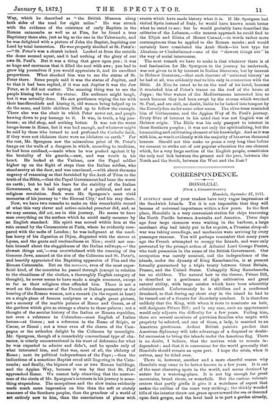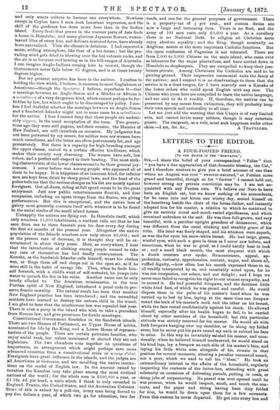CORRESPONDENCE.
HONOLULU.
[FROM A CORRISPONDENT.]
Honolulu, September 27, 1871. I SUSPECT most of your readers have very vague impressions of the Sandwich Islands. Yet it is not impossible that they will become of universal importance within a few years. In the first. place, Honolulu is a very convenient station for ships traversing the North Pacific between Australia and America. Three days ago four large steamers were waiting in the harbour, a large merchant ship had lately put in for repairs, a Prussian sloop-of- war was taking soundings, and mechanics were arriving by every passenger steamer. You will perhaps remember that many years ago the French attempted to occupy the Islands, and were only prevented by the prompt action of Admiral Lord George Panter, who took possession in the name of the British Government. Our occupation was merely nominal, and the independence of the islands, under the dynasty of King Kamehameha, is at present formally guaranteed by a triple treaty between Great Britain, France, and the United States. Unhappily King Kamehameha has no children. The natural heir to the throne, Prince Bill, is described as a gentleman of high cultivation and great natural ability, with large estates which have been admirably administered. Unfortunately he is childless and a confirmed drunkard, so that during my short stay in the island he had to be turned out of a theatre for 'disorderly conduct. It is therefore unlikely that the King, with whom it rests to nominate an heir, will designate Prince Bill ; and in any case, such an appointment would only adjourn the difficulty for a few years. Failing him, there are several members of patrician families who might with propriety be selected, and one of these, a lady, is married to an American gentleman. Ardent British patriots predict that American diplomacy will take advantage of a disputed or doubt- ful succession to bring the islands under the American flag. There is no doubt, I believe, that the natives wish to remain in- dependent ; and that it is convenient for the world generally that Honolulu should remain an open port. I hope the crisis, when it arrives, may be tided over.
There is, however, another and a more cheerful reason why Honolulu may come to be better known in a few years. It is one of the most charming spots in the world, and seems destined by nature for a watering-place. It is not big enough for great mountains, broad rivers, or waterfalls. But the curious volcanic craters that partly girdle it give it a weirdness of aspect that makes the outline of the coast very striking ; the thickly wooded hills of the interior throw out green spurs toward the sea or descend upon dark gorges, and the level land is in part a garden already,
and only wants culture to become one everywhere. Nowhere except in Ceylon have I seen such luxuriant vegetation, and the skill of the gardener has done more here than in the Indian island. Every fruit that grows in the warmer parts of Asia finds a home in Honolulu ; and many glorious Japanese flowers, waxen- leaved lilies of every hue, and delicate-textured ferns, have already been naturalized. Then the climate is delicious. I had expected a moist, stifling atmosphere, like that of a hot-house ; but the pre- vailing wind gets dried in blowing over the hot volcanic rocks, and the air is as buoyant and bracing as in the hill-ranges of Australia. I can imagine Anglo-Indians coming here to recruit, though the thermometer never falls below 65 degrees, and is at times twenty degrees higher.
But my greatest surprise has been in the natives. I confess to holding the view which, I believe, is common to most Englishmen or Americans—though the Spectator, I believe, reprobates it—that a marriage between an Anglo-Saxon and a Hindoo or African is a misalliance of a very dangerous kind, which cannot perhaps be for- bidden by law, but which ought to be discouraged by policy. I con- fess I feel doubtful whether the marriage between an Anglo-Saxon and a Sandwich Islander might not in some cases be a misalliance for the native. I fear I cannot deny that these people are undeni- ably niggers, in the usual acceptation of the term. Two genera- tions ago they were still pagans, and their cousins, the Maories of New Zealand, are still cannibals on occasion. My judgment has not been perverted by my senses, for neither men nor women have much comeliness, and the latter are often portentously fat, and age prematurely. But there is a capacity for high-breeding amongst the upper classes, united to a certain effusive kindliness, which makes their society very charming. The women have soft, low voices, and a perfect self-respect in their bearing. The most strik- ing characteristic of the lower classes seems to be their general joy- ousness. I never before was among people who appeared all of theni to be happy. It is happiness of an innocent kind, for inferior men are kept from drink by sharp penal laws, and the head of the police tells me that the serious charges on his list are mostly against foreigners. Out-of-doors, riding at full speed seems to be the great enjoyment. Just now public entertainments flourish, and four companies, including an opera troupe from the States, are giving performances. But this is exceptional, and the native love of gaiety most generally contents itself with whatever is to be found in the social circles of the small island homes.
Unhappily the natives are dying out. In Honolulu itself, which only numbers 15,000 inhabitants, a resident tells me that he has seen from one to three funerals pass his door every day during the first six months of the present year. Altogether the native population of the Islands numbers now only about 60,000; and at the present rate of decrease, it is thought they will be ex- terminated in about thirty years. Here, as everywhere, I hear that the introduction of clothing among people unused to take any care of themselves has had deadly consequences. The Kanaka, as the Sandwich Islander calls himself, wears his clothes wet, or flings them off and sleeps out in the open air, as if he were still in the habit of savage life. Then, when he finds him- self feverish, with a child's want of self-restraint, he jumps into water to quench the fire in his veins. Another cause can be only briefly alluded to. The American missionaries, in the true Puritan spirit of New England, introduced a penal code to pre- serve female morality. The natural result has been that another New England practice has been introduced ; and the nnwedded mothers have learned to destroy the unborn child in the womb. I am glad to hear that the mischievous law was repealed last year. There is even a party in the island who wish to take a precedent from Roman law, and give premiums for fertile marriages.
Constitutional Government flourishes in the Sandwich islands. There are two Houses of Parliament, an Upper House of nobles, nominated for life by the King, and a Lower House of represen- tatives of the people. There are certain patrician families, who enjoy social rank, but unless nominated or elected they are not legislators. The two chambers vote together on questions of importance, an arrangement which might perhaps save more advanced countries from a constitutional crisis or a coup d'itat. Foreigners have great influence in the islands, and the judges are all Americans or Germans, and are moulding the native institu- tions on the model of English law. In the amount raised by taxation the Kanakas may take place among the most civilized nations of the world ; for the whole sum is £100,000 a year, or £1 13s. 4d. per head, a ratio which I think is only exceeded in England, France, the United States, and the Australian Colonies. Some of this is raised by a poll-tax, every man being forced to pay five dollars a year, of which two go for education, two for
roads, and one for the general purposes of government. There is a property-tax of per cent., and custom duties are now a large and increasing item. There is no fleet, and the army of 100 men costs only £6,000 a year. As a corollary there is no National Debt. In religion all Christian sects enjoy absolute equality ; and the King, though nominally an Anglican, assists at the more important Catholic functions. But the open confession of Paganism is not tolerated. There are from 2,000 to 3,000 Chinese on the main island, who came over as labourers for the sugar plantations, and have settled down in Honolulu as shopkeepers. They are compelled to keep their joss- houses private. Among Christians the Catholics are said to be gaining ground. Their impressive ceremonial snits the fancy of the natives ; and I suspect it is no disadvantage to them that the service is in a dead tongue, for I have scarcely met a Kanaka of the lower orders who could speak English with any ease. The Chinese who come here are compelled to learn the native language, and are said to do it readily. If, therefore, the natives can be preserved by any means from extinction, they will probably keep their own speech and nationality to all time.
Let me just add the warning that this Utopia is of very limited area, and cannot invite many settlers, though it may entertain guests. The emigrant, as a rule, must seek happiness under other











































 Previous page
Previous page